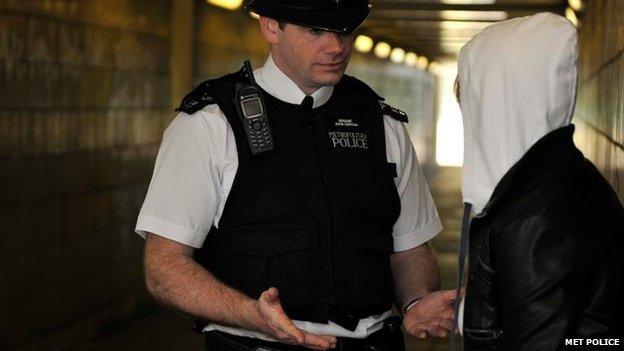Can key crime policies really work?
- Published
- comments

In England and Wales, crime and policing has been largely left off the election agenda - so here are some proposals to kick-start the debate.
The Conservative idea that caught my eye is "flash incarceration".
This is a new kind-of jail term for prolific offenders, which, according to their manifesto, will deliver a "short, sharp" spell in custody - a throwback to Willie Whitelaw's "short, sharp shock" of the 1980s.
Under the plan, offenders who breach community orders would be detained for 48 hours in police cells.
But how will over-stretched police forces cope with that?
And will the scheme, based on a programme across 18 US states which the Tories say has significantly cut re-offending, prove to be more than an election gimmick?
Labour's law and order offering includes a commitment to "keep police on the beat", with a guarantee that neighbourhood policing will be protected in every community.
They have identified hundreds of millions of pounds of savings to safeguard 10,000 police officers they claim will be cut under the Tories.
I would like to know if Labour will promise to maintain officer numbers across the full five-year parliament - and how they can reach their savings target when many forces already complain that they can't make further efficiencies without compromising safety.
Drugs
The stand-out Liberal Democrat proposal is on drugs, an issue that has hardly featured in the campaign.
The Lib Dems would end imprisonment for people caught with drugs for personal use; users wouldn't get a criminal record, but receive civil penalties and be diverted into treatment or education.
But are the Lib Dems worried about the message that might send to young people who are considering experimenting with illegal substances and would they reverse it if they found it led to an increase in the number of users?

Central to UKIP's crime policy plans is a pledge to remove foreign criminals.
But, as successive governments have found, however hard you try to remove foreign offenders, you can't if the receiving country won't take them. Why should UKIP's ideas be any different?
The Greens would expand the use of restorative justice and operate a smaller prison system, with inmates given the right to vote. But are their plans workable?
Restorative justice isn't suitable for all crimes, it relies on the victim to take part and the results are often mixed.
As for Plaid Cymru, the main plank of their proposals is to devolve criminal justice policy to Wales.
But how does that fit into a world in which cross-border crime is said to be on the increase, and the National Crime Squad is playing an increasingly influential role in co-ordinating the fight against serious and organised crime?